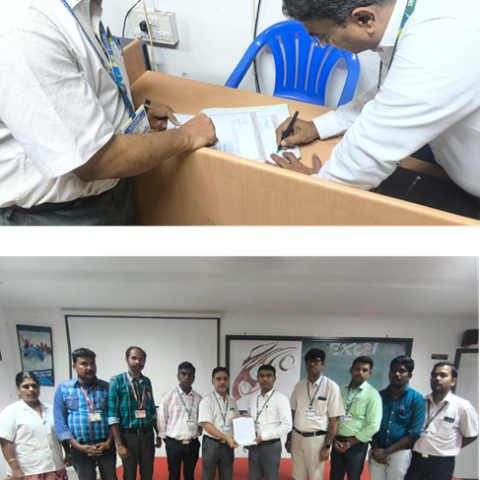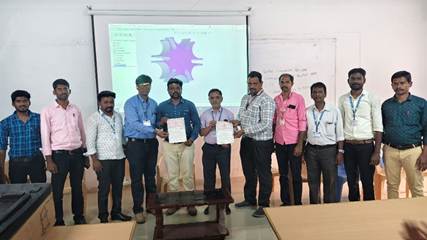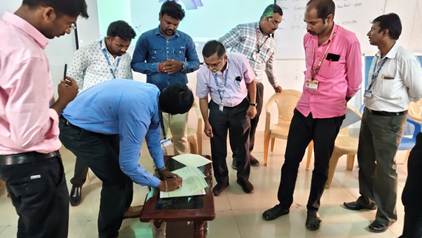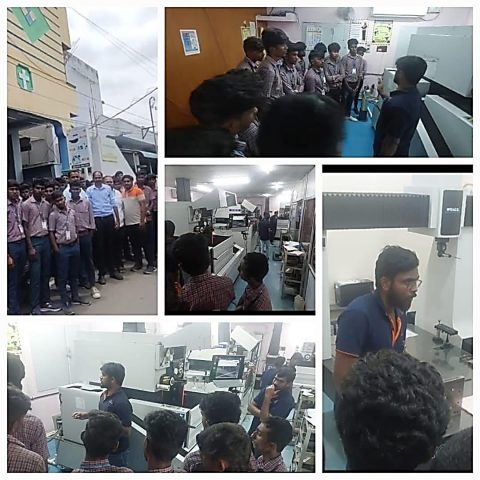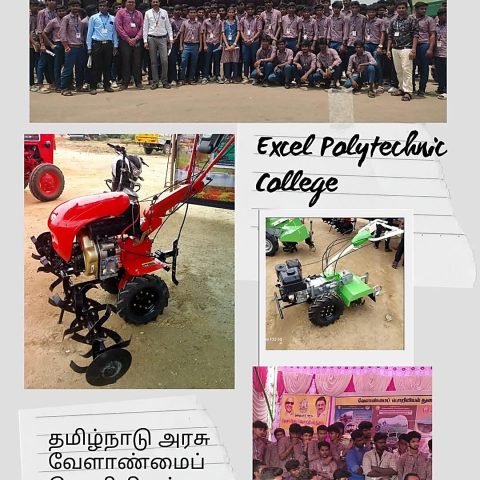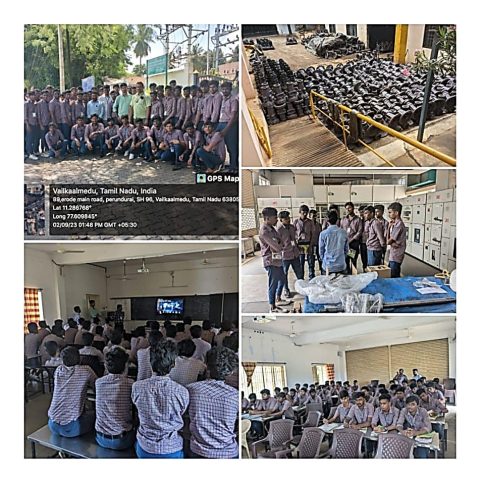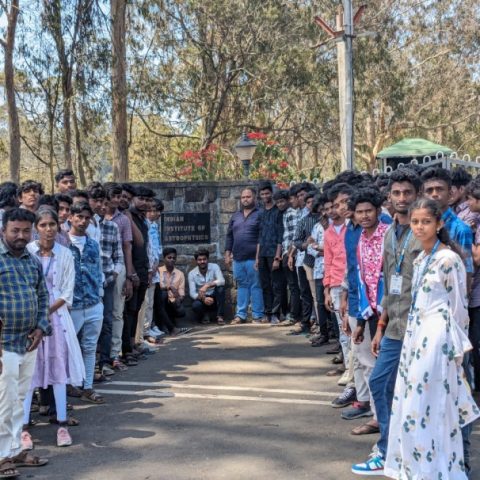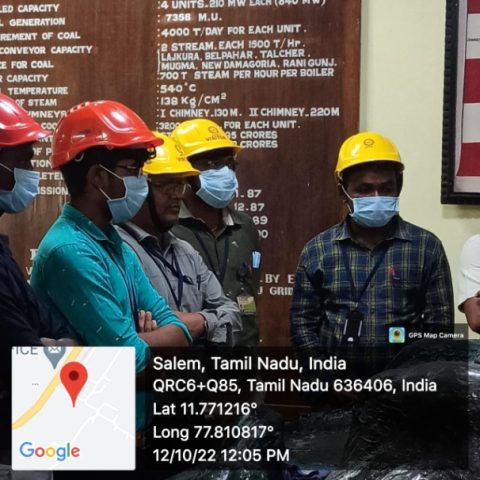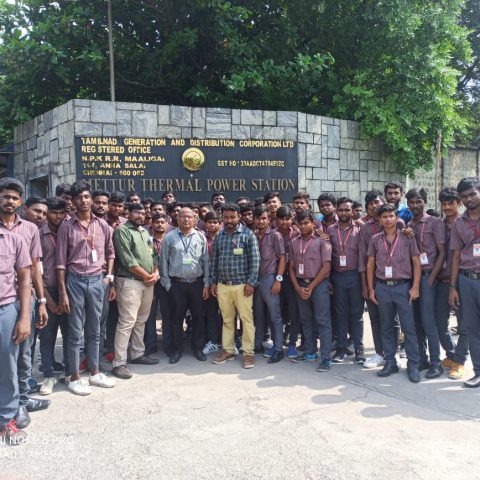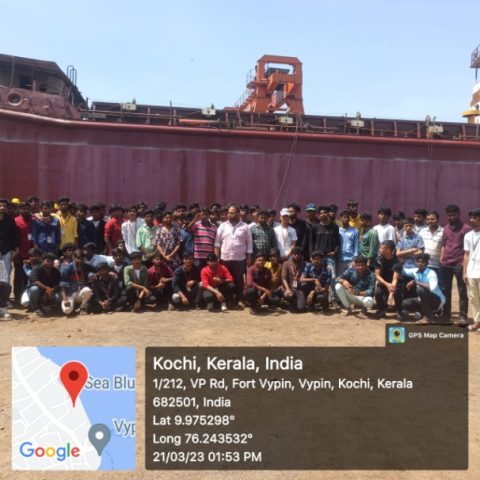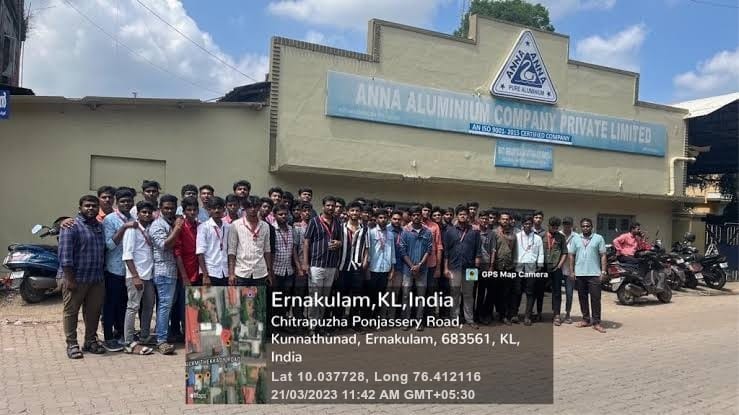Mech Industry tip-up (MOU)
Department of Mechanical Engineering
MOU
Hyundai Motors India, Chennai
Hyundai Motor India Ltd., the country’s largest exporter and the second largest car manufacturer inaugurated ‘Hyundai Professional Development Centre’ at Excel Group Institutions, Namakkal. All the CSR activities are being conducted towards HMIL’s long term commitment of fulfilling its social objectives and support to community enhancement on education standards, in-line with latest technologies through tie-ups with Polytechnic Institutes with specially designed curriculum, training material, car, engine, gear box & other learning aids.
List of Companies
Our students are benefited by the following organizations in the form of campus selection.
- Hyundai Motors India, Chennai
- Sharda Motors Industries, Chennai
- Euro Casting Pvt Limited,
- Taro Pumps Pvt. Limited,
- Gesco India Pvt. Limited
- RANE ( Madras ) Pvt. Limited
- Sakthi Auto Components, Coimbatore
- TVS Training & Service, Chennai
- Royal Enfield, Chennai
- Santhi Gears, Coimbatore
- Larson & Tubro
- KMIL Motherson Pvt Limited
- Valve Tech Q , Coimbatore
- Aristo Equipments and Components, Chennai
1. 6/7/2022- Manufacturing Contracts with SRINIVASA ENGNEERING WORKS for JOINT WORK, DISK WORK, HUB WORK
2. 13.3.2024-Consultancy contract with KALAI COMFORT SYSTEM for Unique Marketing Ideas for Commercial Refrigeration Companies developments
3. 11.7.2024- Product Development contract with SWAMY AGENCIES (Franchisee of Swaraj) for Hybrid Powertrains
4. 2/10/2024- Testing Contracts with HYUNDAI MOTOR PRIVATE LIMITED for TESTING AND TRAINING
Industrial Visit Report
Name of the company: SAIL Refractory Company Ltd, Salem.
Date of visited : 04/04/2025 & 05/05/2024
No of students visited: 138
No of faculties visited: 06
Company Profile:
The Salem Steel Plant (SSP) is a unit of SAIL, which is under the Maharatna PSU, Ministry of Steel, Government of India. It was established in the 1970s. It produces high-quality stainless steel and special steel products
Key features of the plant include:
- Hot Rolling Mill (HRM)
- Cold Rolling Mill (CRM)
- Stainless Steel Melting Shop (SSMS)
- Steel Melting and Continuous Casting Facilities
SSP has received various quality certifications including ISO 9001, ISO 14001, and ISO 45001.
Objectives of the Visit:
- To understand the production process of stainless steel
- To learn about industrial safety and quality control measures
- To observe the integration of mechanical, electrical, and chemical engineering in steel production
- To gain insights into plant operations, logistics, and energy management
Visit Highlights:
a. Steel Melting Shop (SMS): We witnessed the process of melting raw materials using Electric Arc Furnaces (EAFs) and refining them to produce high-grade stainless steel.
b. Hot Rolling Mill (HRM): Observed how slabs are reheated and rolled into coils of desired thickness.
c. Cold Rolling Mill (CRM): Saw the process of cold reduction of coils for precise thickness and surface finish.
d. Quality Control Laboratory: Understand the various testing and inspection techniques used to ensure product quality.
Output of this Industrial Visit:
- Importance of safety measures and PPE in a high-temperature industrial environment
- Advanced automation and control systems used in steel manufacturing
- Environmental practices like effluent treatment and recycling
- Real-world application of engineering concepts like thermodynamics, metallurgy, and material science
Conclusion
The visit to SAIL – Salem Steel Plant was highly informative and enlightening. It helped bridge the gap between theoretical knowledge and practical applications. We thank SAIL-SSP for the hospitality and given the explanations of their production and safety .Also we submit out thanks to arrange the IV by our institution this enriching experience.
Industrial Visit Report
Name of the company : Linga Bhairavi Engineering Pvt Ltd, Coimbatore.
Date of visited : 07/08/2024
No of students visited : 149
No of faculties visited : 05
Company Profile:
Linga Bhairavi Engineering Pvt. Ltd. Is a reputed engineering company based in Coimbatore, known for its expertise in precision machining, fabrication, and custom engineering solutions. The company primarily caters to sectors such as automotive, agriculture, textiles, and general engineering.
Key Areas of Operation:
- CNC Machining
- Metal Fabrication
- Custom Component Manufacturing
- Quality Control and Testing
- R&D Support
Objectives of the Visit:
- To gain exposure to real-time industrial operations.
- To understand the manufacturing processes and workflow.
- To observe the implementation of quality standards.
- To bridge the gap between theoretical learning and practical application.
Visit Highlights:
During the visit, we were guided by the company’s technical team, who explained various operations:
- Manufacturing Unit: We observed the working of CNC machines, lathe operations, and milling processes. The use of Computer-Aided Design (CAD) and Computer-Aided Manufacturing (CAM) software in designing precision components was demonstrated.
- Quality Control Department: The team showed us how components are tested using instruments like Vernier calipers, micrometers, CMM (Coordinate Measuring Machines), and surface roughness testers to ensure dimensional accuracy and quality.
- Assembly and Finishing: The final stages of assembly and surface treatment (like painting and polishing) were explained. The company follows ISO standards for quality and safety.
Interaction with Professionals:
We had an interactive session with senior engineers who discussed:
- Industry expectations from engineering graduates.
- The importance of soft skills and continuous learning.
- Current trends in industrial automation and smart manufacturing.
Key Learning’s:
- Insight into real-time industrial processes.
- Understanding of how theoretical concepts are applied practically.
- Importance of teamwork and process discipline in manufacturing.
- Awareness of workplace safety and environmental considerations.
Conclusion
The industrial visit to Linga Bhairavi Engineering Pvt. Ltd. was a valuable learning experience. It enhanced our understanding of engineering practices and exposed us to the professional work environment. We thank Linga bhairavi for the hospitality and given the explanations of their production and safety .Also we submit out thanks to arrange the IV by our institution this enriching experience.
Industrial Visit Report
Name of the company : Agri Machinery Mela, Agriculture Department Salem.
Date of visited : 30/08/2024
No of students visited : 88
No of faculties visited : 04
Company Profile:
As part of our academic and practical learning, we had the opportunity to visit the Agri Machinery Mela organized by the Tamil Nadu Agricultural Engineering Department at Salem. The Expo aimed to showcase the latest advancements in agricultural mechanization and promote the use of modern tools and technologies among farmers and students.
Objectives of the Visit
- To gain exposure to modern agricultural machinery and implements
- To understand the role of mechanization in sustainable farming
- To interact with industry experts and government officials
- To explore opportunities for innovation in agricultural engineering
Highlights of the Exhibition
The Agri Machinery Mela featured a wide range of exhibits and live demonstrations.
a. Tractor and Power Tiller Displays: Various models of tractors and power tillers from reputed manufacturers such as TAFE, Mahindra, and John Deere were displayed with technical specifications.
b. Soil Preparation Equipment: Implements such as rotavators, ploughs, harrows, and subsoilers were showcased, emphasizing their role in soil health and productivity.
c. Irrigation and Water Management Technologies: Drip irrigation systems, sprinklers, and solar-powered pumps were presented, highlighting water conservation techniques.
d. Post-Harvest and Processing Machinery: Machinery for threshing, milling, grading, and packaging of agricultural produce demonstrated the scope of value addition in farming.
e. Drone and Precision Farming Technology: Live demos of agricultural drones for spraying and surveying, as well as smart sensors for soil and crop monitoring, were conducted.
Interaction and Learning
- Expert Talks: Sessions were held by engineers, scientists, and officials from the Agricultural Engineering Department on the importance of mechanization.
- Farmer Feedback: We had interactions with local farmers who shared their practical experiences and challenges with modern machinery.
- Educational Value: The visit provided insights into emerging trends like AI in agriculture, automation, and climate-resilient tools.
Key Takeaways
- Mechanization is crucial for improving agricultural productivity and reducing labor dependency.
- Smart farming tools like GPS, IoT, and drones are transforming the agricultural landscape.
- There is a growing emphasis on sustainable and eco-friendly machinery.
- Government support and subsidies are vital in making technology accessible to small and marginal farmers.
Conclusion
The visit to the Agri Machinery Mela was an enlightening experience. It bridged the gap between classroom learning and field-level applications. The expo helped us understand how engineering solutions can address real-world agricultural challenges. We thank Agriculture department for the hospitality and given the explanations of their production and safety .Also we submit out thanks to arrange the IV by our institution this enriching experience.
Industrial Visit Report
Name of the company : Diesel Machine Works, Perundurai, Erode.
Date of visited : 02/09/2023
No of students visited : 52
No of faculties visited : 02
Company Profile:
Diesel Machine Works is a reputed manufacturing and service-oriented firm specializing in diesel engine parts, reconditioning, and precision machining. The company caters to various sectors including agriculture, transport, power generation, and industrial engines.
Key Areas of Expertise:
- Diesel engine rebuilding and servicing
- Cylinder head and crankshaft repair
- Precision machining and fabrication
- Component balancing and alignment
- Engine testing and calibration
Objectives of the Visit
- To understand the functioning and components of diesel engines
- To observe machining and repair processes
- To explore quality control methods used in engine servicing
- To gain insight into industrial safety and operational procedures
Areas Covered During the Visit
a. Engine Overhaul Section: We observed how diesel engines are disassembled, cleaned, inspected, and rebuilt. The staff explained the importance of each part and common failure points.
b. Machining Workshop: This section housed lathes, milling machines, boring machines, and surface grinders. Demonstrations were given on how crankshafts, engine blocks, and cylinder heads are machined to precision.
c. Testing Bay: Fully serviced engines were tested for performance, pressure, and emissions. The team used digital diagnostic tools and compression testers.
d. Spare Parts and Storage Unit: The warehouse showcased an organized system for storing engine parts, fasteners, oils, and lubricants.
Key Learning’s
- Detailed understanding of diesel engine components and their working
- Importance of precision in machining and repair for engine performance
- Real-time observation of alignment, balancing, and tolerance checks
- Awareness of workplace safety measures like PPE, tool handling, and fire safety
- Introduction to basic troubleshooting and diagnostic tools used in the industry
Conclusion
The industrial visit to Diesel Machine Works, Perundurai, was a valuable learning experience. It provided practical exposure to diesel engine servicing and mechanical workshop practices, enhancing our understanding of real-world industrial applications. We thank DMW for the hospitality and given the explanations of their production and safety .Also we submit out thanks to arrange the IV by our institution this enriching experience.
Industrial Visit Report
Name of the company : Indian Institute of Astrophysics, Kodaikananal.
Date of visited : 17/02/2024
No of students visited : 140
No of faculties visited : 06
Company Profile:
The Kodaikanal Observatory, established in 1899, is one of the oldest and most prestigious solar observatories in India. It functions under the Indian Institute of Astrophysics (IIA), an autonomous research institute under the Department of Science and Technology, Government of India.
The observatory specializes in:
- Solar Physics Research
- Stellar Spectroscopy
- Historical Astronomical Data Archiving
- Optical and Infrared Instrumentation
Key instruments and facilities include:
- Solar Tunnel Telescope
- Spectroheliograph
- White Light Telescope
- Historical telescopes and photographic solar plates archive
Objectives of the Visit
- To understand the principles and methods of solar observation
- To learn about telescope mechanisms and data collection techniques
- To explore India’s contribution to space and astrophysical research
- To observe historical scientific instruments and records
Areas and Activities Covered
a. Solar Observation
We witnessed the working of solar telescopes, including how solar spectra and sunspots are observed using filters and optics.
b. Telescope Demonstration
The staff demonstrated how equatorially mounted telescopes track celestial bodies. We also learned about the solar tunnel telescope’s operation.
c. Spectroheliograph
An old but functional instrument used to photograph the Sun in various wavelengths was explained in detail, showing the evolution of solar imaging.
d. Photographic Plate Library
We were shown a century-old archive of solar images recorded on photographic plates, crucial for studying solar activity and sunspot cycles.
e. Museum and Historical Instruments
The observatory houses preserved historical telescopes and exhibits detailing India’s early astronomical efforts and global collaborations.
Key Learning’s
- The importance of long-term solar observations in understanding climate and space weather
- How light spectra reveal physical properties of celestial objects
- The precision required in telescope alignment and data recording
- The evolution of astronomical equipment from analog to digital technologies
- India’s significant contributions to global solar physics and astrophysics research
Conclusion
The visit to IIA’s Kodaikanal Observatory was both enlightening and inspiring. It provided real-world exposure to the fascinating field of astronomy and reinforced our theoretical knowledge with practical demonstrations. We gained a deeper appreciation of India’s historical and current contributions to space science. .Also we submit out thanks to arrange the IV by our institution this enriching experience.
Industrial Visit Report
Name of the company : Salem Steel Plant, Salem
Date of visited : 23/03/2022
No of students visited : 50
No of faculties visited : 02
Company Profile:
The Salem Steel Plant, established in 1981, is one of India’s premier producers of high-quality stainless steel and special steel products. It operates under SAIL, a Maharatna company under the Government of India.
Major Facilities at SSP:
- Steel Melting Shop (SMS)
- Hot Rolling Mill (HRM)
- Cold Rolling Mill (CRM)
- Pickling and Annealing Line
- Quality Control and Testing Labs
SSP specializes in producing austenitic, ferritic, and martensitic stainless steel grades, which are used in automotive, construction, kitchenware, and defense industries.
Objectives of the Visit
- To understand the complete process of stainless steel manufacturing
- To observe the functioning of modern rolling mills and melting shops
- To learn about quality control and safety measures in a large plant
- To explore the real-time application of engineering principles in production
Departments and Sections Visited
a. Steel Melting Shop (SMS)
We observed the process of melting raw materials using Electric Arc Furnaces (EAF) and refining the molten steel using Argon Oxygen Decarburization (AOD).
b. Hot Rolling Mill (HRM)
Massive slabs are heated and passed through rollers to produce hot-rolled coils of desired thickness and width.
c. Cold Rolling Mill (CRM)
Hot-rolled coils are further processed to achieve better surface finish and closer dimensional tolerances. Annealing and pickling processes were demonstrated.
d. Quality Control Laboratory
Advanced instruments are used to test the mechanical, chemical, and metallurgical properties of finished products.
e. Environmental and Safety Division
We were briefed on safety practices, pollution control measures, and waste management systems implemented at SSP.
Key Learning’s
- Integration of automation, metallurgy, and mechanical systems in the steel production process
- Importance of safety and environmental protocols in a heavy industry
- Role of continuous casting, rolling, and finishing operations in maintaining product quality
- Real-time exposure to industrial machines like furnaces, roller mills, and testing equipment
- Insight into quality management and ISO certification processes in industrial plants
Conclusion
The visit to SAIL – Salem Steel Plant was highly informative and enlightening. It helped bridge the gap between theoretical knowledge and practical applications. We thank SAIL-SSP for the hospitality and given the explanations of their production and safety .Also we submit out thanks to arrange the IV by our institution this enriching experience.
Industrial Visit Report
Name of the company : Mettur Thermal Power Station, Mettur, Salem
Date of visited : 12/10/20222
No of students visited : 82
No of faculties visited : 04
Company Profile:
The Mettur Thermal Power Station is one of the major coal-based power plants in Tamil Nadu. It is situated near the Stanley Reservoir in Mettur, Salem District.
Key Details:
- Operated by: TANGEDCO
- Installed Capacity: 1440 MW
- Units: 4 units of 210 MW and 1 unit of 600 MW
- Fuel Used: Coal (primary) and oil (auxiliary)
The plant plays a crucial role in supplying power to various regions across Tamil Nadu.
Objectives of the Visit
- To understand the generation and distribution of thermal power
- To learn about the function of boilers, turbines, generators, and cooling systems
- To gain insight into safety, pollution control, and maintenance protocols
- To observe the application of electrical and mechanical engineering principles in a large-scale power plant
Areas and Facilities Visited
a. Coal Handling Plant
We saw the system used to transport and crush coal before it is fed into the boilers.
b. Boiler and Furnace Section
This area explained how coal is burned to produce steam, with a focus on the combustion process and high-pressure steam generation.
c. Turbine and Generator Section
The steam produced is used to spin turbines connected to generators, converting mechanical energy into electrical energy.
d. Cooling Tower and Water Treatment Plant
We learned how water is used in the power cycle and how it is cooled and treated for reuse.
e. Control Room
The centralized control room monitors and manages all operations of the plant. Engineers explained SCADA systems and how load balancing is performed.
Key Learning’s
- Working principles of thermal power generation
- Integration of mechanical, electrical, and chemical systems in plant operations
- Environmental control measures like electrostatic precipitators and flue gas desulfurization
- Importance of regular maintenance and safety standards in heavy industries
- Role of instrumentation and control systems in power plant efficiency
Conclusion
The visit to Mettur Thermal Power Plant was a highly informative and technically enriching experience. It gave us a clear understanding of how electrical energy is generated from thermal sources and the engineering processes involved in power plant operation and management. We thank MTPS for the hospitality and given the explanations of their production and safety .Also we submit out thanks to arrange the IV by our institution this enriching experience.
Industrial Visit Report
Name of the company : Sea Blue Shipyard Limited, Cochin, Kerala.
Date of visited : 21/03/2023
No of students visited : 80
No of faculties visited : 04
Company Profile:
Sea Blue Shipyard Ltd. is a leading private-sector shipbuilding and repair facility in South India, located on the banks of the Cochin backwaters. Established in 2003, the shipyard has developed expertise in constructing and repairing a wide variety of vessels including:
- Barges and Tugs
- Fishing Vessels and Patrol Boats
- Passenger Ferries
- Cargo and Inland Waterway Vessels
Facilities Include:
- Shipbuilding bays and dry docks
- Fabrication and welding workshops
- Assembly areas
- Outfitting and painting sections
- Quality control and inspection departments
Objectives of the Visit
- To understand ship construction and repair processes
- To observe the application of welding, fabrication, and propulsion systems
- To learn about dry-docking operations and hull maintenance
- To explore the integration of mechanical, electrical, and marine systems in shipbuilding
- To gain awareness about safety protocols in shipyard operations
Areas and Activities Covered
a. Fabrication and Assembly Bays
We observed the cutting and welding of steel plates to form ship hull sections using automated and manual welding processes.
b. Dry Docking Area
Engineers explained how ships are docked for repairs below the waterline, including propeller and rudder maintenance.
c. Engine Room Section
We learned about the installation and maintenance of marine engines, gearboxes, and auxiliary systems.
d. Painting and Outfitting Zone
Final surface coating, fitting of internal components, piping systems, and electrical layouts were demonstrated.
e. Design and Drafting Unit
The technical team shared how CAD and 3D modeling are used in designing hulls and ship structures, ensuring compliance with maritime standards.
Key Learnings
- Basics of ship design, modular construction, and floating principles
- Importance of precision welding, testing, and marine safety standards
- Coordination of multidisciplinary engineering in marine projects
- Dry-dock operations and underwater hull inspection techniques
- Challenges in shipbuilding including corrosion control and structural integrity
Conclusion
The visit to Sea Blue Shipyard, Cochin offered us real-world exposure to the complex and fascinating world of shipbuilding and repair. It strengthened our understanding of marine engineering principles and showed the critical role of technology and safety in maritime operations. We thank Sea blue shipyard for the hospitality and given the explanations of their production and safety .Also we submit out thanks to arrange the IV by our institution this enriching experience.
Industrial Visit Report
Name of the company : Anna Aluminium, Cochin, Kerala.
Date of visited : 21/03/2023
No of students visited : 52
No of faculties visited : 02
Company Profile:
Anna Aluminum is a flagship unit of the Anna Group, known for its high-quality aluminum utensils, pressure cookers, and kitchenware. The company has built a strong brand presence in South India and continues to grow through product innovation and customer trust.
Key Products:
- Pressure cookers and cookware
- Aluminum utensils and containers
- Commercial and household kitchenware
- Customized industrial aluminum products
Manufacturing Capabilities Include:
- Aluminum casting and molding
- Die-making and pressing
- CNC machining and finishing
- Anodizing and polishing
- Quality control and packaging
Objectives of the Visit
- To understand the aluminum casting and manufacturing process
- To observe die-making and product design techniques
- To study quality control measures in mass production
- To understand branding, packaging, and marketing strategies
- To connect classroom theory with real-world industrial applications
Areas and Sections Visited
a. Casting and Foundry Section
We observed the process of melting aluminum, pouring it into molds, and forming basic utensil shapes. Safety protocols in high-temperature zones were explained.
b. Pressing and Forming Unit
This section involved mechanical and hydraulic presses used to shape products with precision. We learned how dies and molds are critical to achieving consistency.
c. Machining and Finishing
Machines like lathes, CNCs, and surface grinders are used to finish the product edges and surfaces. Anodizing and polishing enhance corrosion resistance and appearance.
d. Quality Control and Testing
Here, products undergo weight, thickness, and pressure resistance tests (especially for pressure cookers). Strict quality standards are followed before packaging.
e. Packaging and Branding Section
We saw how products are labeled, packed, and stored. Staff also explained their distribution network and how Anna Aluminum maintains its market presence.
Key Learnings
- Basics of aluminum casting and product design
- Role of mechanical presses and dies in shaping metal parts
- Importance of finishing processes like polishing and anodizing
- Industrial safety practices in metalworking environments
- Insights into supply chain and retail branding strategies
Conclusion
The industrial visit to Anna Aluminum, Cochin, was highly educational and provided valuable real-world exposure to the aluminum product manufacturing process. It offered us a clearer understanding of how theoretical knowledge in manufacturing, materials, and design is applied in a commercial production environment. We thank Anna Alumium for the hospitality and given the explanations of their production and safety .Also we submit out thanks to arrange the IV by our institution this enriching experience.



